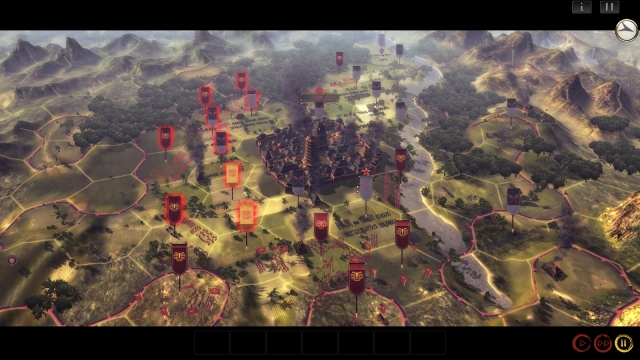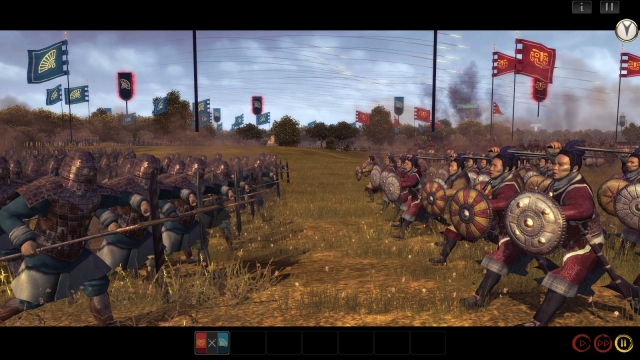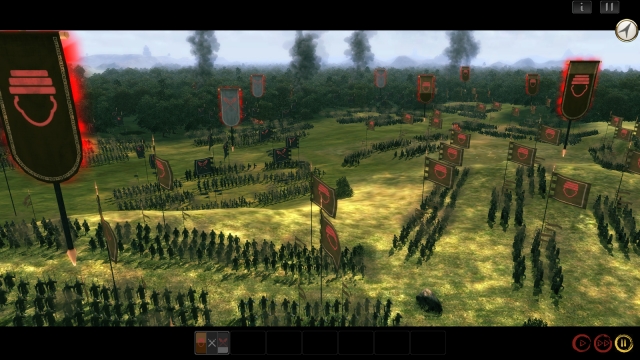
Oriental Empires Preview
Eastern history, in particular Chinese history, is tragically ignored in western teaching. As such, most Westerners’ exposure to that part of the world (aside, perhaps, from Japan) is minimal. How many Chinese emperors can you name? How many powerful families? Can you name any cities? Don’t worry if you struggle, I know would. As someone who gathers far too many of his historical interests from videogames, Chinese history is something of a black hole in my mind purely because there are pretty much no games that actually explore the topic. Thankfully, Oriental Empires looks to change that. A smart gameplay presentation at this year’s Gamescom took me from ignorant buffoon to fully-fledged fan; it’s one of the most ambitious and impressive strategy games I’ve seen for a long time.
China, in particular the Three Kingdoms period, has consistently been one of the most requested time periods for kingpin strategy title Total War. The warring period is seen by many as an ideal setting for the diplomacy and warfare that accompanies such a game. With Oriental Empires however, the viewpoint isn’t quite as constrained. Instead, players will see their faction evolve through 3000 years of Chinese history from 1500 BCE to 1500 CE, an impressively huge time period bettered only by the likes of Civilization. I’ve mentioned both purposefully, because there are plenty of comparisons to be made between Oriental Empires and both Civ and Total War. I don’t think I’ve ever described a game as a combination of those two outstanding titles, so the prospect alone is exciting. 
The Civilization aspect is instantly recognisable to anyone who’s played the perennial 4X game. The hex-based map of Ancient China is all very Civ, so too are the game’s varying factions, diplomatic strategies and research trees. Of course, the unique Chinese flavour separates Oriental Empires from the distinction of a clone, and so too does a really impressive commitment to historical accuracy. Armies aren’t recruited slowly over time, as in reality they’re held in reserve and mass-deployed when your nation needs them. Or, to use another great example, the nobles and the peasants within your empire are handled separately. Appeasing one group may antagonise another, and if you push one group far then they alone will rise up in rebellion.
With all this talk of mass deployment and rebellions, it’s hard not to notice that there are elements of Oriental Empires that are much more akin to Total War than Civilization. Considering several members of the development team once worked for The Creative Assembly, that’s hardly surprising. As well as those relatively small differences previously mentioned, the closest relation to Total War is the amazing level of detail and zoom. From a wide-scale aerial view of Ancient China, the player can slowly pan the camera in until individual men can be seen ploughing the fields or preparing for battle. They’re not like Civ’s freakish giants either, but rather to-scale sprites that are usually a few hundred per army.
 Even on paper that sounds awesome, but seeing it in real life is something else entirely. I was shown that impressive zoom level in such a nonchalant fashion I had to get the developer to take me through it again - I just couldn’t believe that level of detail was possible on such a huge map. Total War obviously takes the cake in terms of pure volume of units on-screen at once, but those battles are completely separate from the games’ large campaign maps. In Oriental Empires, it’s all on one screen. I found that to be hugely impressive, and while some may pass that off as a novel gimmick, I’d argue that features such as this are fantastic for becoming immersed in the game world. My issue with Civ is that it’s just too historically random and not detailed enough to let your imagination run wild. Oriental Empires shouldn't have this problem at all.
Even on paper that sounds awesome, but seeing it in real life is something else entirely. I was shown that impressive zoom level in such a nonchalant fashion I had to get the developer to take me through it again - I just couldn’t believe that level of detail was possible on such a huge map. Total War obviously takes the cake in terms of pure volume of units on-screen at once, but those battles are completely separate from the games’ large campaign maps. In Oriental Empires, it’s all on one screen. I found that to be hugely impressive, and while some may pass that off as a novel gimmick, I’d argue that features such as this are fantastic for becoming immersed in the game world. My issue with Civ is that it’s just too historically random and not detailed enough to let your imagination run wild. Oriental Empires shouldn't have this problem at all.
It helps that the version of the game I saw had a really tidy UI that should be great for both long-term fans of the genre and people who are intrigued by the theme alone. All of the systems seemed to feed nicely into one another. For instance, the edicts mechanic works alongside the technology tree system, allowing players to push their empire in a certain cultural direction. Plus, the technology includes interesting paths such as philosophy and religion, certainly creating a much more interesting development of both tech and ideas throughout your faction. With that huge time frame as well, there’s sure to be a hell of a lot of cool things to unlock. That historical accuracy comes to the fore once again here too, as all of the edicts and upgrades are historically realistic events/developments. 
The ways to win a game of Oriental Empires are similar to other games, although according to the developer I spoke with (a really cool, humble, guy named Bob), the game will rely much more on your ability to handle vassals rather than pure military domination. There are parts of Oriental Empires that remind me of Paradox grand strategy games - the limit on owned provinces, for instance, or the focus on realistic game mechanics. If you’ve ever seen any of my Paradox grand strategy articles, you’ll know that’s not a link I make flippantly. Another element the game has in common with the like of EUIV or Crusader Kings II is hands-off battles. Now admittedly, the battles in Oriental Empires should be much more interesting to watch than in CKII, but they’re still all about preparation rather than military tactics.
All you need to do is set your armies up, end your turn, and watch them collide with the enemy in pitched open battle or dramatic sieges. The version I saw seemed a little clunky, but I can certainly see the potential. Some may baulk at the lack of control, but anyone who’s played CKII and the like will know that it’s a system that can be just as dramatic as the direct control of Total War. With Oriental Empires you can actually watch the fight unfold too, and on that front it’s once again very Total War. Considering all of these comparisons with other strategy titles, I wouldn’t be surprised if you’re worrying that Oriental Empires doesn’t have a voice of its own. Fear not, from what I’ve seen so far, this could well be one of the best strategy titles ever produced from a small studio. It’s looking deep, brilliantly tactical and incredibly beautiful.
Oriental Empires is due to enter Early Access before the end of the year, and I for one can’t wait.








COMMENTS